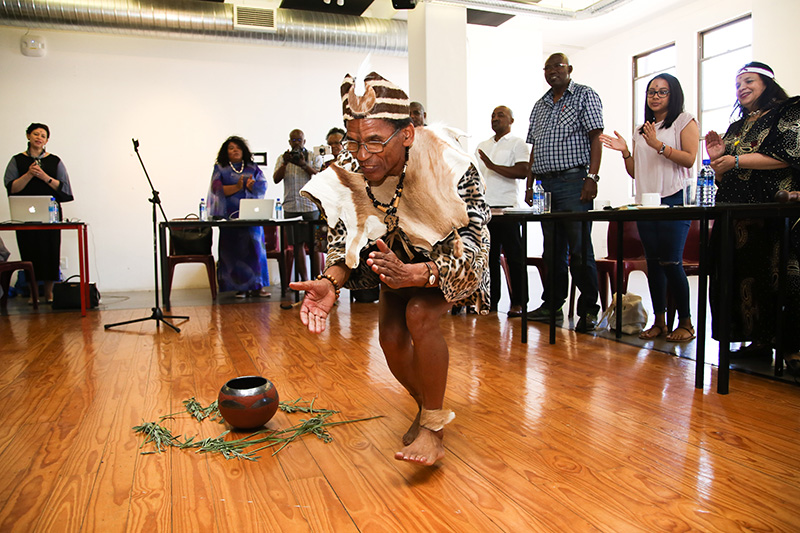
SUMMARY
‘Huriǂoaxa’ means ‘mountain rising out of the sea’ and it is the Khoekhoe language name for what Europeans called ‘Table Mountain’, in the capital city in South Africa in what is now called Cape Town. While the colonial name reflects the view from the water—a flat land form—the Indigenous name captures geology and environmental history, leading into the relationship between the land and the peoples who lived there. This kind of erased knowledge is the subject of a new WUN-funded partnership between academic and Indigenous communities, which stands to have major implications for how we understand and care for the world around us.
STORY
The repression and denial of Indigenous knowledge is an injustice that makes all societies poorer. As described by Dr June Bam-Hutchison (University of Cape Town), who leads a group awarded a 2020 Research Development Fund grant, the loss is drastic but not final: ‘It’s this huge invisibilised archive’ of indigenous epistemologies and knowledge: ‘They do exist, they are there, but they are trapped in the languages that have been erased.’ Like others she collaborates with, Bam-Hutchison was taught by her late mother, though their indigenous languages, targets of persecution, were silenced.
There has been increasing recognition from academics of the need to decolonise learning practices, not merely by bringing in marginalised materials or perspectives but by fundamentally challenging the epistemologies on which education has been based: whose forms of knowledge are considered valuable or important, whose world view is normative, where power lies. However, engagement with these ideas varies considerably between disciplines and in different national contexts. In research, exploitative practices remain frequent. The San Code of Research Ethics was developed by first nation peoples of Southern Africa and published in 2017 to promote practises based on respect, honesty, fairness and care.
Bam-Hutchison highlighted the importance of the recovery of indigenous knowledge and techniques in relation to the current climate emergency. There are large gaps in our understanding of the environment and sustainability: ‘When you’re not listening, you don’t understand what people mean in terms of what the landscape means to them, how sustainability was managed and why, what to look out for, what the signs are of a landscape or climate in distress, of animals or insects, the whole ecology in distress.’
She pointed to the concept of ‘Dadirri’, an idea of deep listening rooted in the language of the Ngangikurungkurr people from northern Australia, as fundamental to their method and ethos. The WUN-funded group also draws on the concepts of ‘!Gâ re’, which means listening in Khoekhoegowab, and of ‘Rangatiratanga’, a Māori concept of intellectual self-determination that is important to their perception of these different knowledges as an ecosystem. These are the organising concepts that will structure the group’s work, but they anticipate more ideas coming to the fore through deep listening with Indigenous communities as the project unfolds. Bam-Hutchison emphasised that their process will be iterative and open-minded while identifying concepts that can be used directly in practice and analysis.
She believes the impact of making visible Indigenous knowledges will be profound. As methods are often where academics stake their expertise, ‘scholars who are very much focused on the methodologies within the disciplines will find this theory of different ways of knowing and restorative justice within epistemologies problematic.’ It challenges their very sense of what scholarship is.
Nonetheless, Bam-Hutchison has found that this resistance can be overcome by grounded, systematic mutual engagement: ‘I believe it is the future. I believe that this is going to be the only way we will be able to move forward in many areas of scholarship, to make them relevant and to have a more sustainable future. So we might as well start to invest in it now.’
—
Dr June Bam-Hutchison is Principal Investigator of the group entitled !Gâ re – Rangatiranga – Dadirri : Decolonizing the ‘capture of knowledge’. Its WUN member universities are University of Alberta, the University of Auckland, University of Bristol, University of Cape Town, University of Ghana, University of Massachusetts Amherst, the University of Sydney, the University of Western Australia, University of York and Zhejiang University. For more information see their WUN Interdisciplinary Research Group (IRG) page.